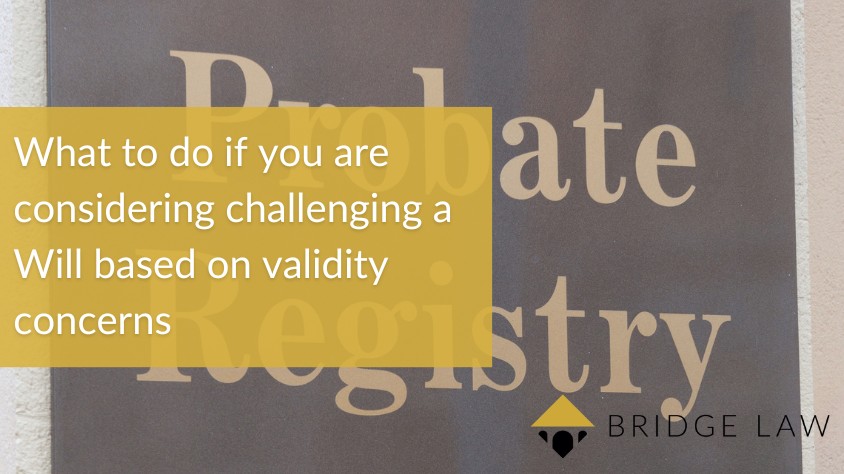What to do if you are considering challenging a Will based on validity concerns

Over the years, we have seen the number of people raising probate disputes increase. Whatever the reason for disputing a Will, we always recommend seeking early advice to determine the right course of action, which may require you to take immediate steps to prevent probate from going ahead. In this article, we’ve shared our advice on the first steps to take when you have concerns over the validity of a Will.
The first point of call if you have concerns over the validity of a Will
If, for any reason, you have suspicions over the validity of a Will, your first point of call should be to seek independent legal advice to assess your case and determine what steps you will need to take.
At this stage, you will need to look into entering a caveat with the Probate Registry as a matter of urgency. A specialist contentious trust and probate solicitor can assist you with entering a caveat if they deem this an appropriate course of action.
You can learn more about some common reasons the validity of a Will is questioned in our blog ‘A short guide to preventing probate disputes’.
How entering a caveat with the Probate Registry can help
It is important to lodge a caveat as quickly as possible before the grant of representation is issued confirming someone is the executor of a Will, which enables them to administer the estate.
Lodging a caveat prevents probate from proceeding for up to six months, and the caveat can be renewed after 6 months if matters haven’t been resolved. Entering a caveat at this stage provides an opportunity for parties on both sides of the case to resolve concerns over the Will and its validity, with the peace of mind that all assets of the estate are preserved and unable to be distributed until the matter is resolved.
Applying for a caveat before a grant of probate is issued can help to resolve matters more easily between yourselves or via solicitors or mediation. This can avoid entering into a complicated and convoluted litigation claim further down the line, which can be costly and very upsetting for all parties involved at what is an already upsetting time when emotions are running high.
What happens if you haven’t entered a caveat before a grant of representation is issued
If a caveat is not entered before probate is granted, it can be much more difficult and costly to reverse the probate via an order for revocation of the grant. If you plan to go ahead with challenging a Will and applying to reverse probate, you should seek specialist legal advice to determine the merits of your case, the likelihood of success and an estimation of the possible costs involved.
Be aware that entering a caveat may not lead to a quick resolution
Although Caveats can be hugely helpful if all parties involved are willing to cooperate and reach a resolution – they are not silver bullets, and they can be challenged by the other parties too.
In this situation, there can be cost consequences flowing from entering a caveat or not withdrawing your caveat if given notice to do so (a legal warning). If you enter a caveat and are given notice, you must choose to either make an appearance at court to make the caveat permanent or withdraw it to allow probate to be granted.
If you are considering challenging a Will, speak to our specialist contentious trust and probate team for advice on 0161 427 0084 (Marple Bridge) or 01484 442 700 (Holmfirth). Alternatively, you can email us on info@bridgelawsolicitors.co.uk.
contentious probate, Contentious trust and probate, Will dispute
